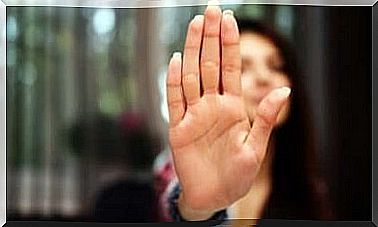How To Handle Criticism And Learn From It

When we receive criticism, we often experience it as a personal attack, a hurtful and, in some cases, embarrassing comment, something that hurts and bothers us. Therefore, dealing with criticism is often not so easy and one of our first reactions is to become defensive.
Letting a criticism affect us that much is not a good idea, especially if it’s unjustified. Rather than getting defensive, it ‘s much better to respond to criticism assertively. In this way, we can take advantage of them and avoid a lot of suffering.
First of all, it’s important to ask a series of questions about the criticism we receive, as not everyone intends to harm us. For example, what is the objective of the person who criticizes us? Why does she do this? What are your reasons?
If when we receive criticism, we don’t stop to think about why that person is so angry or what their reaction is, we will likely become defensive. However, if we avoid getting carried away by our impulses and calm down, everything will be much simpler. We see situations differently when we act calmly.
Now, if we decide that the person who criticizes us is wrong, but we don’t challenge them, or accept what they say, we are allowing others to manipulate us. Furthermore, our self-esteem will be affected because we are not respecting ourselves.

dealing with criticism
When a person doesn’t know how to accept criticism, he usually reacts by apologizing (“yes, but …”), criticizing or even trying to avoid it at all costs. There are also those who accept them superficially, but without the conviction of the need for change.
All of these behaviors are harmful because they understand criticism as attacks. That way, we will likely feel bad and also be unable to learn from them.
How to accept criticism?
If we learn to react calmly to criticism, we will learn to control our negative emotions. If we are calm, we will be able to understand better what they say to us and take advantage of it. In this way, we will be able to assess the other’s intentions and see if it was with bad intentions or not.
If criticism is constructive, we can learn from it and use it to improve something in ourselves or in our lives. Now, if the other person has failed to express himself correctly, we can show him a way to say things to avoid spoiling the relationship.
If it’s an attempt at manipulation, the best response is not anger or irritation, but the ability to express what we think assertively, calmly and calmly. In fact, when we don’t react with anger, we don’t show our weaknesses.
If the other person is right and we are wrong, the ideal is to correct our mistakes. If, on the other hand, this is not the case, the ideal is that we reaffirm our position. If the other person doesn’t agree, it’s best not to get into conflict.
When we are calm in the face of a criticism, we can emerge victorious from a situation that, in most cases, would become unpleasant. Responding assertively helps us not to feel attacked and protect our self-esteem.

How to successfully respond to criticism
Receiving a review is not pleasant, especially when we believe that what we are told is not true. In this article, we’ll look at how to respond to criticism successfully and how to get the most out of it.
After receiving a critique, the first step is to analyze and change our inner speech, that is, what we say and think in silence. For example, we can say the following: “I don’t have to prove anything because no one is attacking me. Listen carefully to what she says, this can be very helpful. Try to understand what she wants. The fact that she criticizes you doesn’t mean you failed.”
Next, we must evaluate the criticisms. This will help us to decide whether we should change our behavior or whether it is appropriate to reject what we have been told constructively. For this, we can ask ourselves and reflect on the following points:
- Reflect on who is making the criticism. Is he qualified? Does he know me well enough? Does he know what he’s talking about?
- What is the other person’s purpose in making the critique? Its purpose may be to make you feel bad, but it may also be to come to terms and demonstrate what is bothering you so that there is a change.
- Ask yourself if it’s a criticism you get often. Is it the first time you’ve heard this criticism or are there more people who agree with it?
- How much energy do we need to expend on the change suggested by the critic? Maybe it doesn’t pay off…
- Assess the emotional mood. Maybe the person was angry at the time and you shouldn’t take their comments into account. The emotional moment gives a different nuance to the situation. We can all say things we don’t feel in an angry moment. Sometimes it’s best to relativize.

What to do if the criticism is adequate?
If criticism is appropriate, then we can act in a number of ways. Are the following:
- Controlling emotions. The ideal is not to get angry, but to manage how we feel.
- Do not defend yourself in the face of criticism. If what others say is true, then there is no reason to defend yourself. It’s a waste of time and energy.
- Actively listen. An appropriate response is to actively listen, that is, to pay attention to the message so that we can better understand what they are telling us and respond appropriately to criticism.
- Ask for more information and look for data to help us change. It’s time to find alternatives and not get angry.
- Ask for specific information on how to change. One of the key questions would be “How could I do it better?” Both for the other person and for ourselves.
- Summarize what we’ve been told to make sure we understand everything very well. Make a final summary and ask your interlocutor if he understood correctly.
- Establish a strategy for change. Plan and execute behaviors that help us change.
As we’ve seen, there are two basic ways to handle criticism. If criticism does not proceed, we must put ourselves in the other person’s shoes and try to understand why they criticize us. If, on the other hand, the criticism is justified, then it is better to be assertive and change what is being criticized.
references
- Caballo, V. Social skills assessment and training manual. S. XXI Editorial. 2002
Goleman, D. The practice of emotional intelligence. Kairos Editorial. 1999









